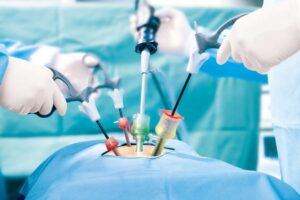DN Hospital: Laproscopic Surgery Hospital
Laparoscopic Hernia Mesh Repair Surgery at DN Hospital, Panipat

Advanced, Minimally Invasive Hernia Repair for Faster Recovery and Lasting Relief
At DN Hospital, Panipat, we specialize in laparoscopic hernia mesh repair surgery, an advanced minimally invasive technique designed to repair hernias effectively, promote a speedy recovery, and significantly reduce postoperative discomfort. Our skilled surgical team combines years of experience with state-of-the-art technology to ensure that each patient receives high-quality, compassionate care and an optimized outcome.
Why Choose Laparoscopic Hernia Mesh Repair?
Laparoscopic hernia mesh repair surgery is widely regarded as the most effective and patient-friendly approach for hernia repair. Unlike traditional open surgery, laparoscopic surgery involves making a few small incisions through which a laparoscope (a thin tube with a camera) and specialized instruments are inserted. The surgeon views the hernia area on a high-definition screen, enabling precise placement of a mesh over the hernia defect. This advanced approach provides a variety of benefits, including:
- Minimally Invasive: Small incisions result in less tissue disruption, reduced pain, and quicker recovery.
- Lower Risk of Infection: Small incisions reduce the risk of postoperative infections.
- Reduced Scarring: Minimal incisions lead to smaller, less visible scars.
- Faster Recovery: Patients typically experience shorter hospital stays and return to daily activities sooner.
- Decreased Risk of Recurrence: Laparoscopic repair combined with mesh placement provides stronger support, minimizing the chances of hernia recurrence.
Types of Hernias Treated with Laparoscopic Mesh Repair at DN Hospital
We provide laparoscopic mesh repair for various types of hernias, ensuring personalized care for each condition:
- Inguinal Hernia: A common type of hernia that occurs in the groin area.
- Umbilical Hernia: Located near the belly button.
- Incisional Hernia: Often occurs in areas of a previous surgical incision.
- Hiatal Hernia: Part of the stomach pushes up into the chest through the diaphragm.
Click here to see all Types of Hernia
What to Expect from Your Hernia Treatment
We’re committed to guiding you every step of the way through your treatment. Here’s what you can expect at DN Hospital:
- Comprehensive Evaluation: Your journey begins with a thorough consultation with our surgical team, who will assess your condition and discuss your symptoms, medical history, and treatment options.
- Personalized Treatment Plan: Based on the diagnosis, we will create a tailored treatment plan to best address your specific type of hernia and personal health needs.
- State-of-the-Art Surgery: Our surgeons use the latest laparoscopic technology to ensure precise mesh placement and optimal hernia repair.
- Dedicated Postoperative Care: After surgery, our medical team will provide detailed instructions and ongoing support to facilitate a smooth and speedy recovery.
Your Safety and Comfort Are Our Priority
At DN Hospital, your well-being is our top priority. Our hospital is NABH accredited, ensuring that we maintain the highest standards of patient safety and care quality. We are also on the panel for numerous insurance providers, offering cashless treatment options to ease your financial concerns.
Schedule a Consultation Today
Experience the benefits of cutting-edge, minimally invasive hernia repair at DN Hospital, Panipat. Contact us at 0180 4010201 or +91 98124 33331 to schedule a consultation or to learn more about our laparoscopic hernia mesh repair procedure. We’re here to help you on the path to a quick recovery and a life free from hernia discomfort.
FAQs for Hernia Surgery/Treatment/ Operation
Hernia surgery is a medical procedure to repair a hernia, a condition where an internal part of the body pushes through a weak spot in the muscle or tissue surrounding it. This can be done using traditional open surgery or minimally invasive laparoscopic surgery.
Laparoscopic hernia repair offers several benefits, including smaller incisions, less pain, quicker recovery time, and minimal scarring compared to traditional open surgery.
While you may experience some discomfort after surgery, laparoscopic hernia surgery is generally less painful than open surgery. Pain can be managed with prescribed medications, and most patients recover quickly.
The recovery time after laparoscopic hernia surgery is usually faster than open surgery. Most patients can return to light activities within 1-2 weeks and full activities within 4-6 weeks, depending on individual health and the type of surgery.
As with any surgery, there are potential risks such as infection, bleeding, nerve damage, or hernia recurrence. However, these risks are generally low, especially with laparoscopic procedures performed by experienced surgeons.
Candidates for hernia surgery include individuals who have a hernia causing pain, discomfort, or other complications. Surgery may also be recommended for hernias that are growing or not improving with non-surgical treatments.
Hernia surgery is typically performed under general anesthesia, which means you will be asleep during the procedure. In some cases, regional anesthesia or local anesthesia may be used depending on the surgery's complexity.
After surgery, you will be monitored in a recovery room for a few hours. You may experience mild discomfort or swelling around the surgery site. Most patients can go home the same day and resume normal activities after a short recovery period.
To reduce the risk of hernia recurrence, avoid heavy lifting or straining, maintain a healthy weight, and follow the postoperative care instructions provided by your surgeon. Regular follow-ups and monitoring may also be advised.
Yes
Yes, you can check insurance companies under insurance menu on top
